Sometimes pushy, sometimes distant, Amazon keeps businesses near its Seattle HQ alive
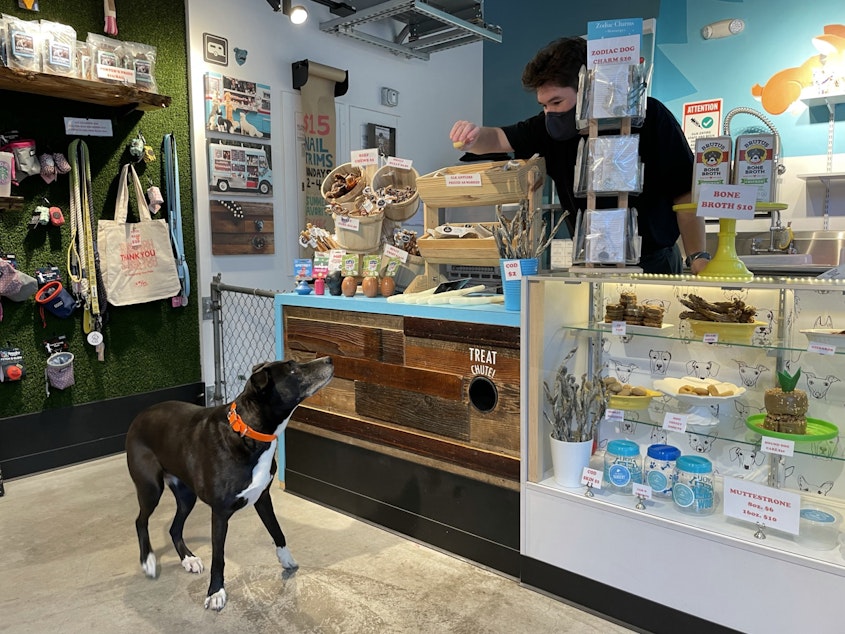
Before the pandemic, Seattle’s South Lake Union neighborhood was bustling with tech workers, tourists, and residents. There were lines outside popular lunchtime spots.
The neighborhood quickly became a ghost town when the pandemic hit. It's not anymore.
In some parts of Seattle, neighborhoods seem to have fallen into a coma during the pandemic. But along 6th and 7th Avenues in the shadows of Amazon's Spheres, it’s just a little sleepy.
There’s a quiet but constant hum of activity. Security guards and landscapers trudge up and down the sidewalks. And there are some people, walking dogs. An occasional worker with a sandwich.
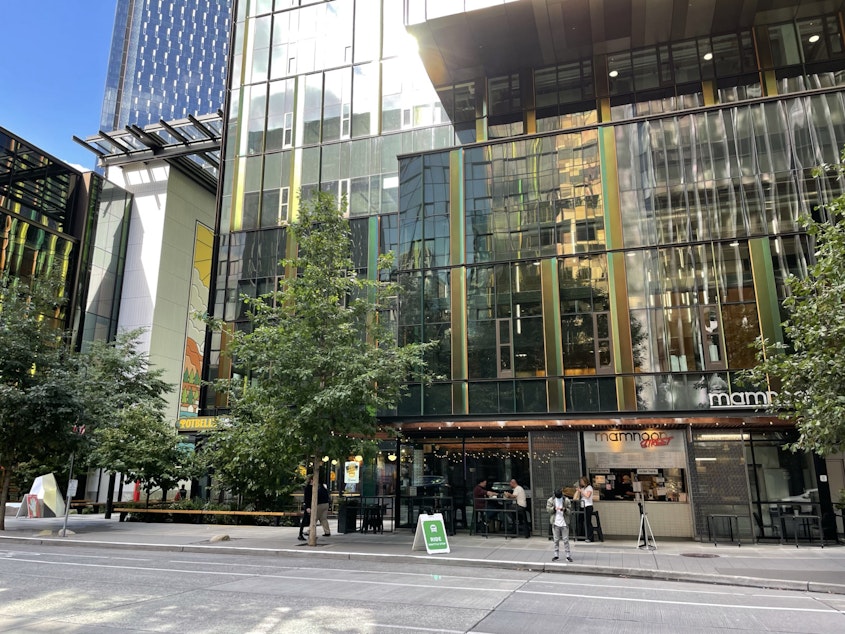
Still, like any other neighborhood, some businesses here have failed.
Lucy Xioa lives across the street from Amazon. She’s lost track of all the restaurants that have gone under.
Sponsored
“I have a list on my phone of things I want to try," Xioa said. "And after the Covid, I click on a location and it says it’s permanently closed, so I just have to delete them.”
But more often, businesses here say they are still open today because of Amazon. An Amazon spokesperson said that so far, the company’s given out $16 million through its Neighborhood Small Business Relief Fund. The company wouldn’t comment on which local businesses have benefited, but it’s not hard to find examples.
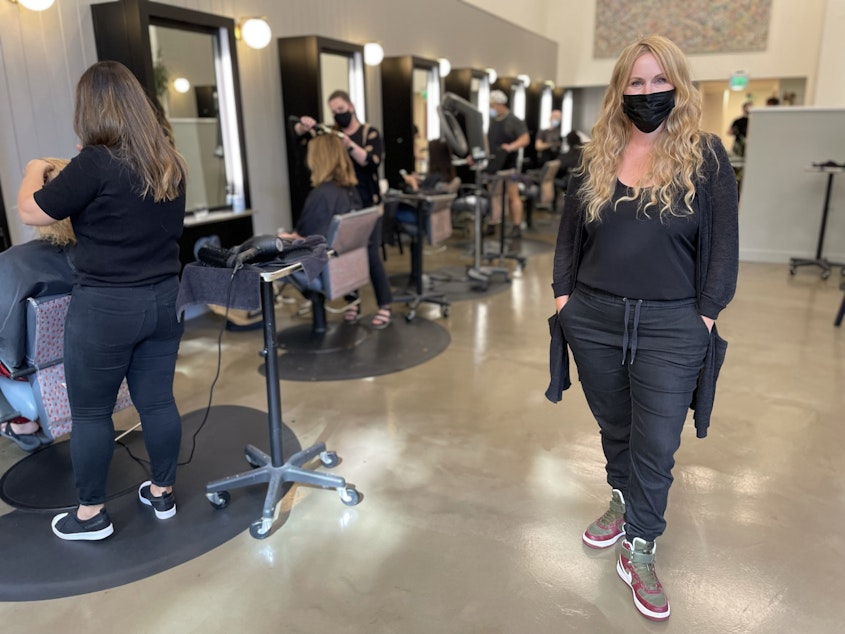
The Robert Leonard Salon is across the street from Amazon. On the day I visited, women sat in chairs with stylists, getting color corrections and “Brazilian blowouts.” Some sat at a counter by the window with a view of the spheres, checking their phones, while little bits of foil in their hair worked their magic.
Becca Stordahl started years ago here, as a stylist. Now, she’s one of the owners.
Sponsored
One of her clients told her about Amazon’s grant program. She applied on her cell phone, and was told via email that her business had been awarded $43,000. She never interacted with a human at Amazon to get that grant.
“I didn’t even know who to send a thank you card to," she said. "I mean, I responded when we got it – there was a place for comments — but I don’t know who got it, or what. It would have been nice to know who ... I could have really thanked.”
Same thing happened at the Seattle Glassblowing Studio, a few blocks away. The manager Cyrena Stefano wanted to make sure Amazon knew she was grateful, so she put a big vinyl "Thank you Amazon" sign in her window.
"Because, it's huge, right?" she said of the grant.
Generally speaking, it appears that the closer businesses are to Amazon, the more help they’ve gotten during the pandemic. And you can’t get closer to Amazon than to rent space in one of Amazon’s buildings.
Sponsored
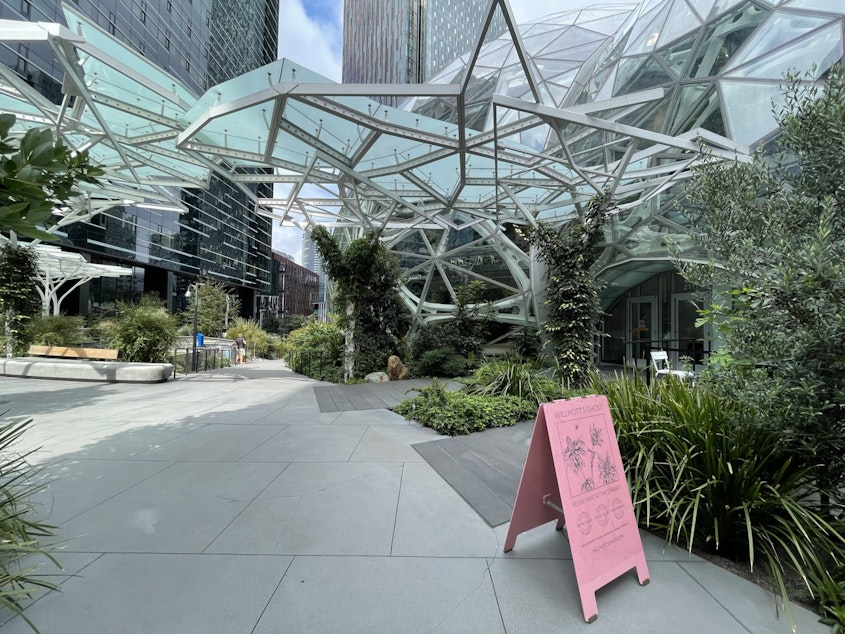
Willmott’s Ghost is an Italian restaurant in the base of Amazon’s spheres. Jeremy Price is one of the owners.
“I know Amazon can be a controversial topic for folks," he says. "Our experience with them as a landlord, as a tenant of theirs, has been really positive.”
He says Amazon hasn’t demanded rent for a year and a half, and won’t make them pay until their revenue is back up. And as far as he knows, Amazon has completely forgiven that debt.
"I would say without this help, we wouldn’t have been able to stay,” Price said.
Sponsored
Mamnoon Street is another restaurant on the same street. It specializes in quick meals for Amazonians on lunch break. When I visited, the kitchen was full of workers. But just a single customer stood at the counter waiting for their food.
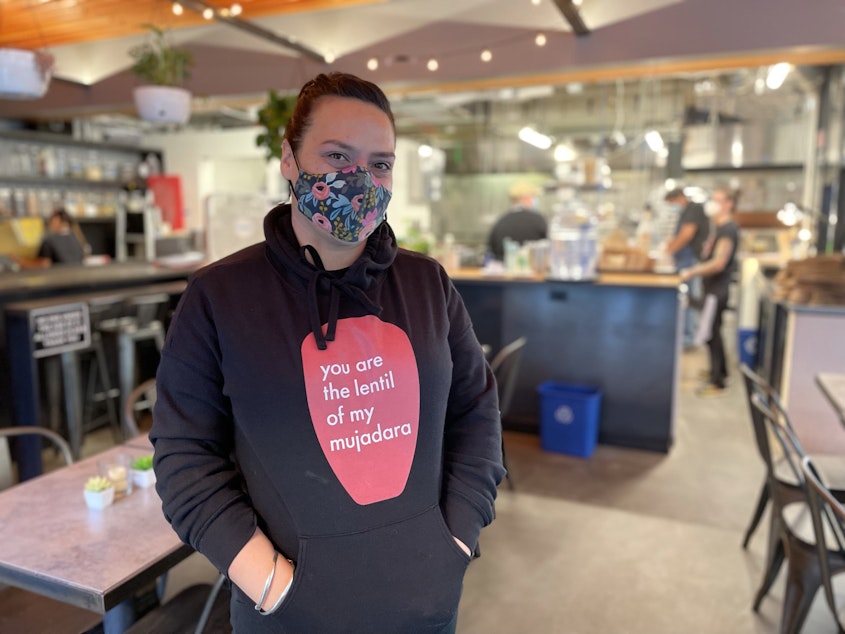
Ángela Ortez-Davis is a manager here. She says Amazon covered her business's rent, too. It also asked her business to open up a little sooner than she was ready.
“I get why they want it to be busy," she said. "It’s just really terrifying as a manager of people in the middle of a pandemic to know which of these decisions make the most sense for everyone; for everyone’s paycheck and for everyone’s health.”
But she says it’s been worth it, because she knows Amazon will survive the pandemic, and now, she will too.
Sponsored
“At this point I feel pretty grateful, because I feel like we’re attached to something that’s bigger than us that will take more to topple, frankly.”
Beyond rent relief, Amazon is currently giving free marketing support to at least 31 businesses that rent space in its South Lake Union buildings. They include a bakery for dogs (called a "barkery") and a pop-up store for the record label Subpop.
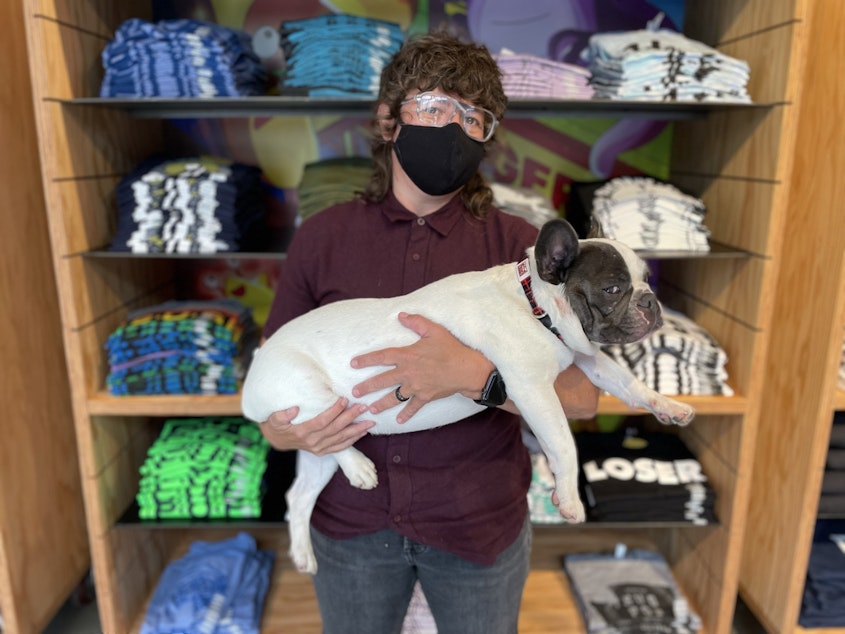
“They’ve brought influencers in, they’ve come through and taken videos – so they definitely are trying to promote our store, as well as the others on campus," said Subpop manager Rachel Rhymes.
Amazon has a big influence on who succeeds here. But not every business nearby gets the same level of protection.
Kitty corner from Amazon’s spheres is Dimitrious’ Jazz Alley. It’s been here much longer than Amazon.
Ari Dimitrious manages the place. He says, his business depends on visitors from all over the region, from Vancouver to Portland. He seldom sees employees from Amazon in his club.
“They’re letting us use their parking, which is wonderful of them," he said. "But we didn’t reach out for help and they didn’t reach out to us. So we didn’t receive any help from Amazon. I mean, that’s OK, you know. But we’re appreciative of what they’ve done for our neighbors.”
His business is doing fine without Amazon, though. On the night I visited, The Delvon Lamarr Organ Trio played to a packed house.
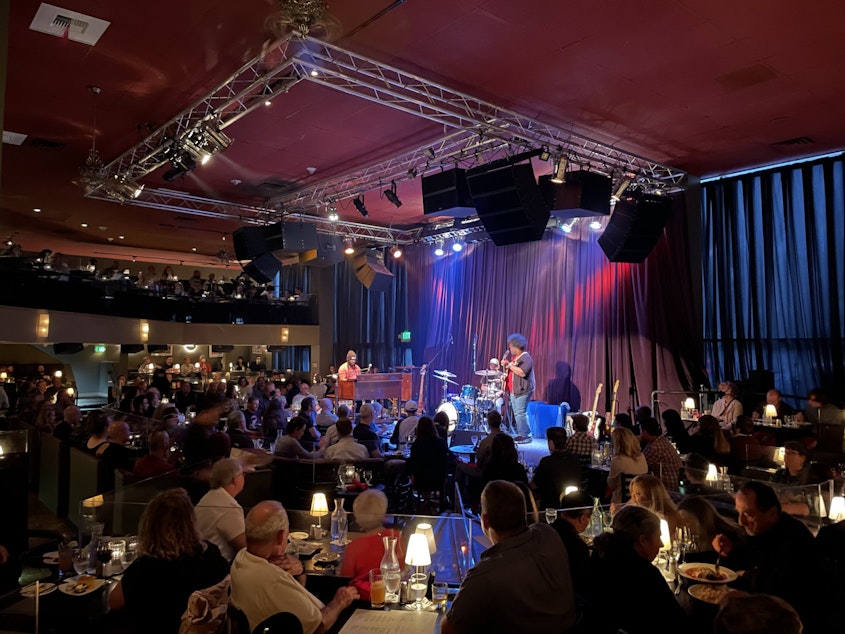
All around South Lake Union, businesses expressed gratitude for Amazon’s generosity, whether they received money from the company or not.
But generosity probably isn’t the right lens through which to view Amazon’s actions. That’s according to Jacob Vigdor, a professor of public policy and governance at the University of Washington.
“Amazon is generous sometimes. Amazon is not generous sometimes,” he says.
Vigdor points to Amazon’s fight against corporate taxation as an example of "not generous." He says Amazon’s actions in South Lake Union should be understood as part of an effort to hold on to highly skilled workers, most of whom are still working from home.
“Amazon is trying to make sure that the place that it has to offer its workforce when they go back into the office continues to be an appealing place," Vigdor says.
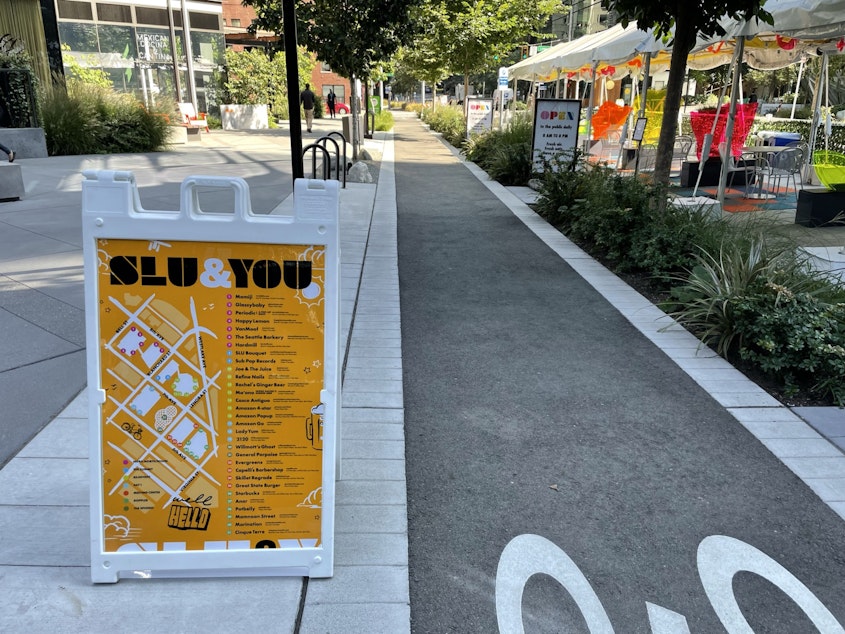
Vigdor says if the stories in media are all about Amazon's neighborhood turning into a ghost town, with no places to eat, and no jazz clubs, where there are no amenities of any sort, the workforce working from home might quit Amazon and take another job. Workers could decide to go work for Facebook in Bellevue’s Spring District, around a light rail station currently under construction. Or they could move somewhere far away with a lower cost of living and join a company that lets them work remotely forever.
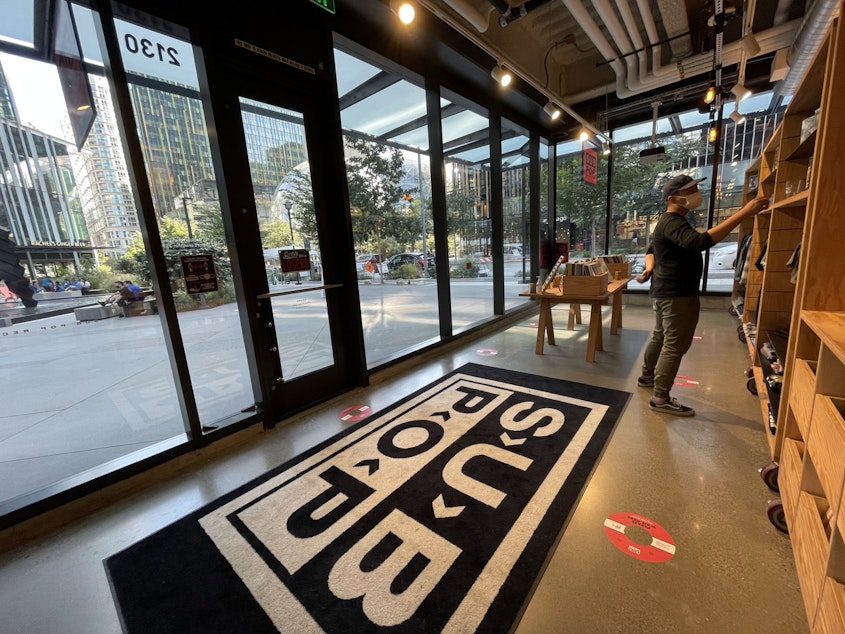
Amazon’s large footprint in the South Lake Union neighborhood puts the company in a unique position to shape the neighborhood around it.
Some may perceive that work as generous. But Amazon benefits too.
This story is part of our series "The Main Street Project," which looks at our region's economic recovery, one street at a time.




